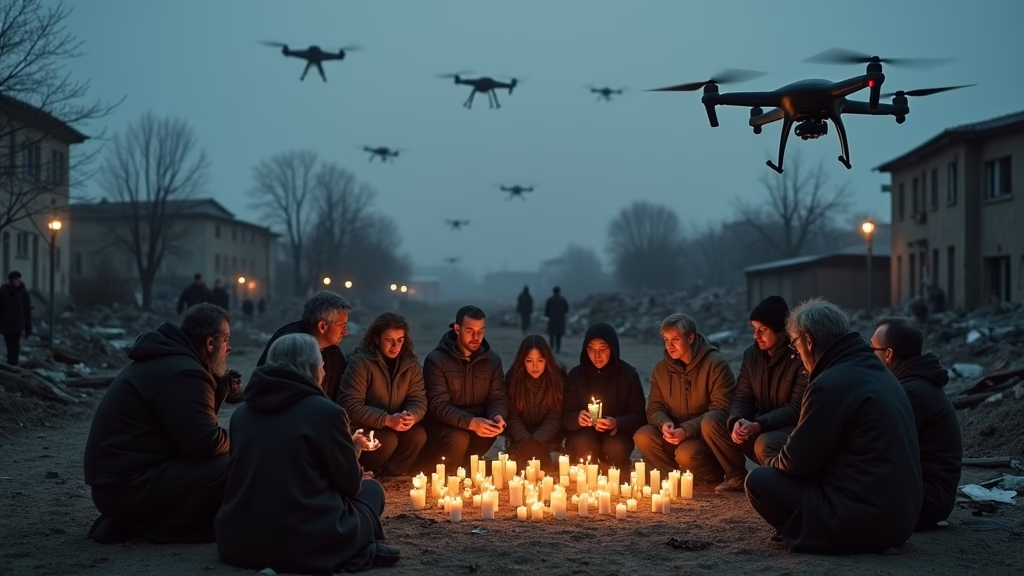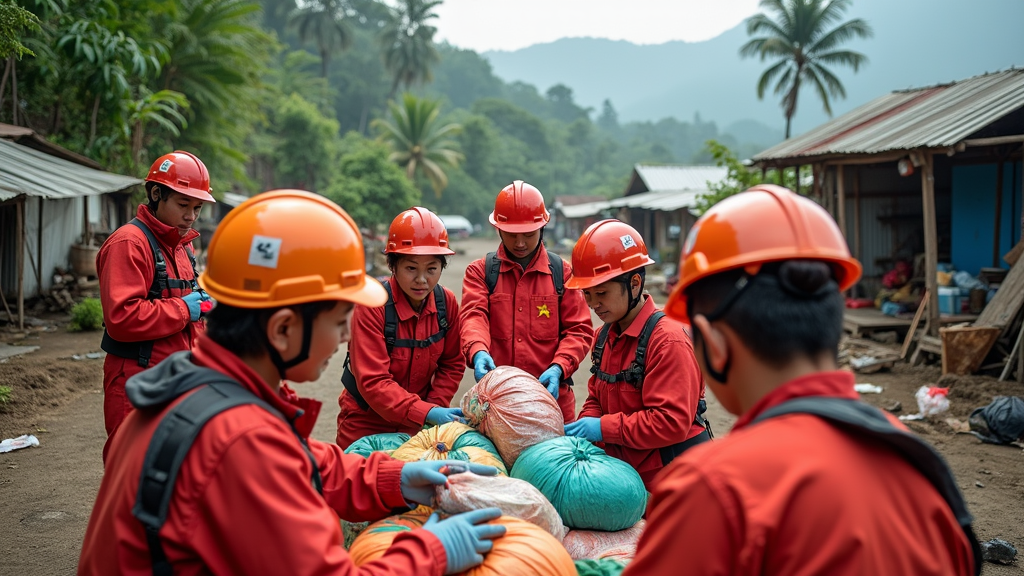Russian Drone Attack on Ukrainian Bus: Tragedy and Aftermath
Tragedy Strikes: Russian Drone Attack on Bus in Ukraine
Ladies and gentlemen, as we gather our thoughts in the reverberating aftermath of the Russian drone attack on a civilian bus in Ukraine, it is essential to grasp the gravity of the events that unfurled on May 17, 2025. In a rapidly evolving landscape of conflict, this incident resonates with a crushing weight, intertwining personal stories of loss with the larger narrative of an ongoing war that refuses to relent. With reports from reputable sources like Sky News and Kyiv Independent, the complexities of the situation invite us to delve deeper into the heart of the tragedy.
The Incident Unfolds
On that fateful day, as the sun rose over a war-torn landscape, anticipation lingered in the air. Families were embarking on their daily routines, unaware that calamity was on the horizon. The stark reality came crashing down when reports confirmed the existence of a drone incursion that would change countless lives forever. Initial reports floated around the numbers, with Sky News citing nine fatalities and four injuries, whereas Kyiv Independent suggested an evolving narrative beginning with eight dead before eventually aligning with Sky’s figures. This fluctuation in numbers exemplifies the chaos that is so often a hallmark of war, where human lives can be reduced to statistics, and truth becomes a shaky ground upon which the narratives are built.
A Discrepancy of Perspectives
Amid these harrowing reports comes a revelation wrapped in conflicting narratives: While Ukrainian authorities emphasize the loss of innocent lives aboard a civilian bus, Russian media outlets like TASS contend that the drone targeted a military object. This discord points not only to a dissonance in truth but raises significant questions about accountability and the nature of war itself. Ladies and gentlemen, consider the implications: If the attack was indeed on civilians, it could be construed as a blatant violation of humanitarian law, a potential war crime draped in the shroud of misinformation.
The Ukrainian government, through voices like that of Igor Tkachenko, the head of the Sumy regional military administration, condemned the attack, identifying it not merely as an assault on a vehicle, but as an affront to humanity itself. “This is a dark day for us,” Tkachenko stated, as he joined the people ushering in a period of mourning. Furthermore, Yuriy Zark, the mayor of Bilopillia, conveyed the devastating emotional toll experienced by those who lost their loved ones. In each word, there lies a weight of grief, a visceral connection to the very fabric of human life that war threatens to unravel.
The Aftermath: A Nation in Mourning
As tributes pour in and candles flicker in the memories of the deceased, the impact of this tragedy continues to resonate. The stories behind the numbers haunt us: mothers losing children, friends left in shock, communities shattered as families are torn apart. It serves as a brutal reminder of the often underrepresented faces behind the headlines. Beyond the immediate chaos of military engagements lies the fervor of civilians who bear the weight of decisions made at high tables far removed from their realities.
Negotiations and Their Fractured Promises
Compounding this tragic event is the context within which it occurred—shortly after failed peace negotiations in Turkey that had faltered without yielding a semblance of a ceasefire. What was once thought to be a glimmer of hope has now transitioned into a harrowing confirmation of the harsh nature of ongoing warfare, where promises are made and broken amidst the turmoil. While some families sought refuge in words of hope and diplomacy, this attack extinguished what flicker remained within a beleaguered populace.
Moreover, amid the tragedy, an exchange of prisoners had occurred, a flicker of humanity in an overwhelmingly dark narrative. Yet, the detachment of such exchanges from civilian realities often underscores a disheartening aspect of war, showcasing a chasm between those charged with decisions and the lives affected by them—echoing the sentiment that peace negotiations, however significant, can feel like a hollow echo when the drums of war beat with an unrelenting ferocity.
In the Callous Shadows of War
As the narratives continue to unfold, the haunting question remains: how many more lives will be lost in this relentless cycle of destruction? The imagery is stark; the drone, a harbinger of devastation, reduces lives to mere data points, while the relentless rhythm of warfare continues unabated. We look into the faces of victims, their stories interwoven in the larger tapestry of human experience, and wonder when this cycle of violence will break.
Perhaps, Ladies and gentlemen, in examining such tragedies, we discover a deeper implication of our shared humanity—a call to reflect on the dire consequences of conflict, on the consequences of decisions made from a distance, and on the resilience of those who continue to endure the unrelenting storm of war.
In this relentless pursuit of understanding, we can only hope that within the rubble of loss, within the profound sorrow, we find the seeds of peace yet to bloom.
For more insights into our complex world and to stay abreast of the latest developments, follow us on our Telegram channel – Завжди свіжі новини.
The Voices of Grief and Resilience
The aftermath of the drone attack reverberates through the communities affected, each story a poignant reminder of humanity’s fragility amidst chaos. Friends and families convene in the somber moments following such a tragedy, sharing tears and memories of those who have been lost. The emotional weight is palpable, saturating the air with unuttered goodbyes and unrealized futures.
Echoes of a Tragic Announcement
In the days that followed, memorial services sprang up across Ukraine, uniting a nation in grief. Vibrant candles illuminated darkened streets, shedding light on the collective anguish as citizens mourned together. This sense of shared loss can shatter barriers of division, reminding us that pain is a universal language. The media outlets, armed with updates and analyses, bore witness to this solemnity, articulating not just the stark numbers but the intimate stories of individuals caught in the crossfire.
While the government works tirelessly to provide support for the families affected, the challenge remains: how to reconcile the political fallout and the human cost? Commentaries from experts have begun surfacing, dissecting the implications of the drone strike and questioning the motivations behind such military actions. As highlighted in a recent piece by the New York Times, the stark reality of civilian casualties can no longer be obscured in the fog of war. Each strike serves as a grim reminder that the cost of conflict extends far beyond strategic victories; it seeps into the very fabric of society, altering lives forever.
A Divided Narrative
The Russian narrative seeks to legitimize actions with claims of targeting military assets, yet this assertion stands counter to the evidence presented by Ukrainian authorities. This stark discrepancy raises profound questions about accountability and the ethics of warfare. With each conflicting statement, the truth dances elusively out of reach, leaving the victims lost amid a cacophony of propaganda. The Ukrainian military responded to the attack with declarations of condemnation, but the psychological impact is irrefutable, lingering long after the debris has settled.
The Call for Justice
As discussions around war crimes gain momentum, voices advocating for justice grow louder. Ukraine’s National Police declared the act a violent transgression that must not go unpunished. Those affected yearn for accountability, clinging to whatever semblance of justice may come from the ashes of their loss. The challenge lies not just in legislative discussions but in the collective will of the international community to observe and intervene.
As we look upon the fractured landscape of human lives, a question looms large: what steps can be taken to ensure that incidents like this do not fade into the annals of history without consequence? The call for international scrutiny echoes, demanding that the world recognizes the gravity of each lost life as not merely a statistic, but a narrative of hope, dreams, and potential extinguished too soon.
The Path Forward
In confronting the harrowing realities of loss, it becomes increasingly vital to establish pathways toward healing. As Ukraine navigates this turbulent chapter, the resilience of its people shines through, standing as a testament to the human spirit’s indomitable nature. Neighborhoods come together, enveloping one another in support and shared resolve, a small but powerful statement against despair.
Moreover, discussions surrounding peace negotiations persist, underscoring the complexity of achieving a lasting solution amidst ongoing violence. With each diplomatic encounter, may we hope for fruitful dialogue that prioritizes humanity over territorial gains, understanding over conflict. The energy required to rebuild after devastation demands not only the resilience of a nation but also the compassion of the international community.
As the memories of the victims remain etched in the consciousness of those left behind, we must strive to ensure their stories are not silenced, but sung through ripples of advocacy and remembrance. Each candle lit, each prayer whispered, is a difference made—an assertion that lives lost will not fade into obscurity.
In reflecting on the events that transpired on that tragic May day, we emerge with a clearer vision of the humanity that binds us together, regardless of the wars that seek to divide. It is through empathy and awareness that we can unite against the tragedies of the world, honoring the fallen while forging a path toward a more peaceful existence.
Stay informed and navigate the complexities of our shared reality by following us on our Telegram channel – Завжди свіжі новини.
latest video
news via inbox
Subscribe to the latest news in the world of politics and technology







